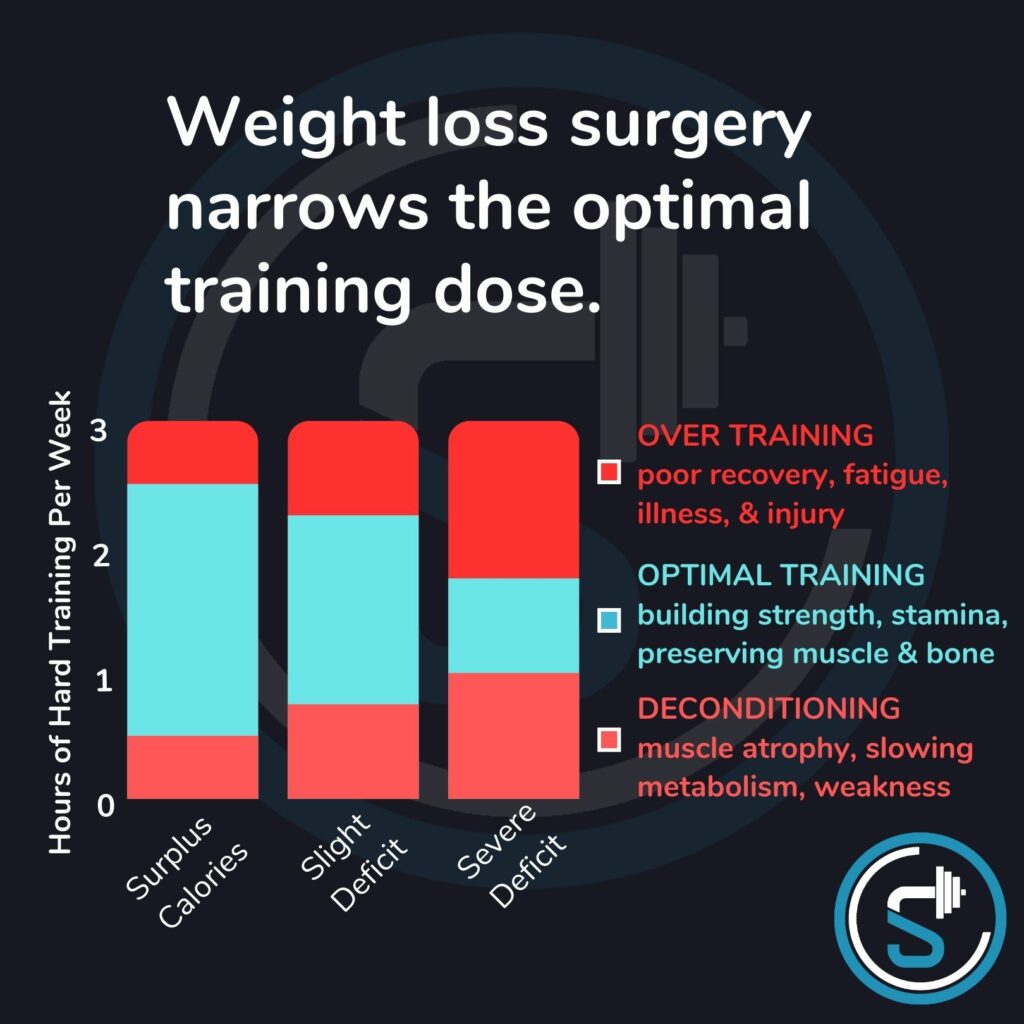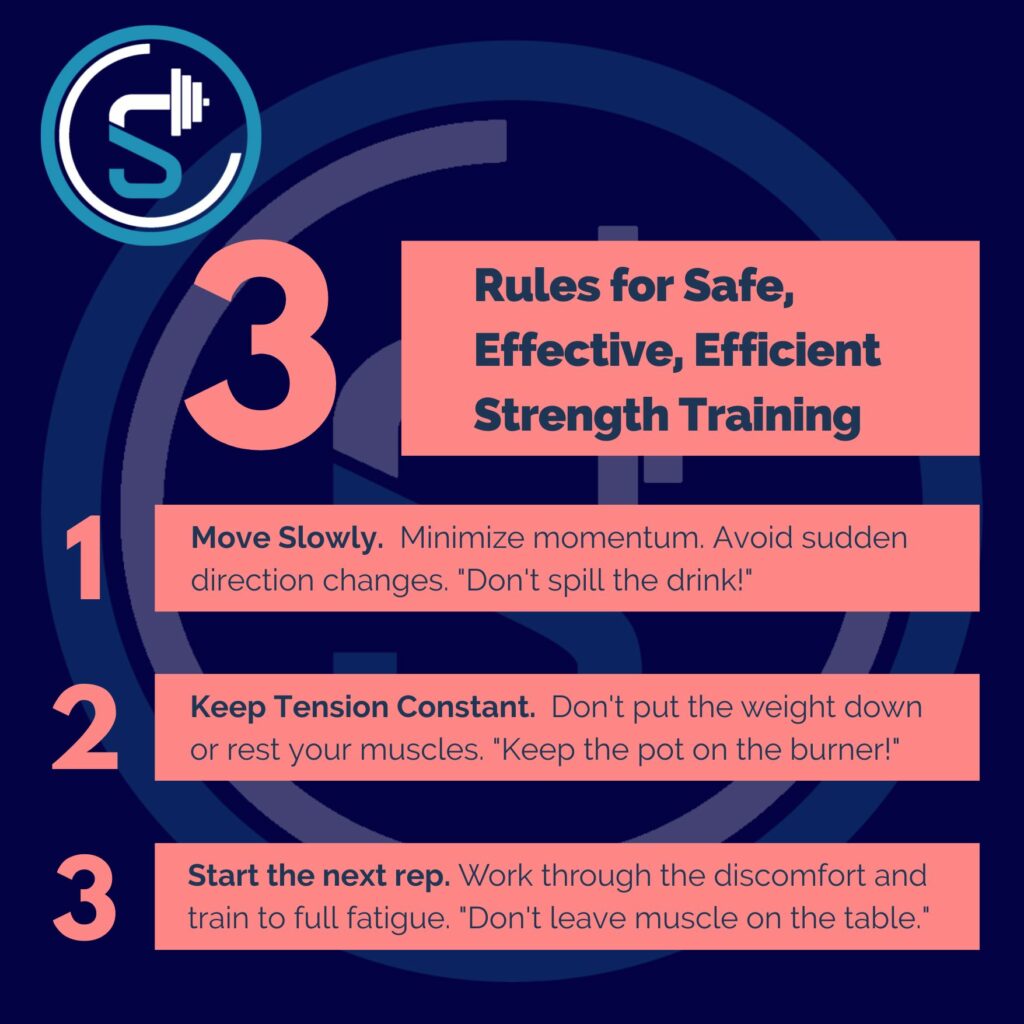In this article, I want to address the uniquely challenging physiological conditions that occur after bariatric surgery. Due to reduced stomach volume, a recovering person is initially able to eat just 300 to 600 calories per day. This causes rapid loss of both body fat and muscle mass. but can leave you feeling low energy. Unfortunately, the resulting fatigue makes it very difficult to perform the strengthening and toning exercises essential to prevent muscle loss after bariatric surgery.
This article is part of a series of articles on properly dosing exercise. It applies to anyone exercising in a severe and prolonged calorie deficit. Whether from a gastric bypass surgery, or from taking a weight loss drug, such as a GLP-1 agonist like Ozempic, you’ll find this helpful. This could also apply if you are pregnant or nursing, where every excess calorie goes to your baby.
How much you eat affects how much you should train.
In a calorie surplus, we can train a lot, or very little!
In the first article, I discussed how the rules are very different when the body has lots of excess resources. Someone eating in a calorie surplus (more food than they need) can get away with both more AND less exercise. On the one hand, the extra calories and amino acids will allow them to recover from more hard training. On the other hand, the fact that they have surplus energy in their diets means their bodies aren’t going to become “catabolic” (breaking down muscle) quite as quickly from disuse. People eating as much as they want can simply get away with very minimal training and still preserve some muscle.
Dieters need to avoid both too much AND too little exercise.
Once we modify our diets to induce the calorie deficit needed for weight loss, our wiggle room goes down a little. We can’t recover from as much exercise, which lowers the upper limit of our training. But, we also can’t get away with an extremely minimalist routine either. In the absence of regular, challenging exercise, our bodies will start breaking down our muscle mass for energy when calories and proteins are scarce.
And that’s just what will happen when we create a modest calorie deficit. Most people looking to shed a few holiday pounds will find that a small deficit of just a few hundred calories per day is the most sustainable way. But with bariatric surgery, or certain weight-loss drugs, the deficit is FAR larger – between 500 and 1500 kcals per day!
Bariatric surgery creates an extreme calorie deficit.

Any severe calorie deprivation is likely going to cause the loss of muscle tissue. This is because muscle mass serves as a giant savings account which our bodies can draw upon for amino acids when they are deficient in the diet. These amino acids are used for countless processes, from repairing and replacing our skin, hair, and gut-lining, to the synthesis of neurotransmitters, antibodies, hormones, among other essential compounds. A person will often lose over 45% of their fat mass after bariatric surgery, but they can also lose 20% of the strength and muscle mass in their legs at the same time.
Muscle loss means a slower metabolism.
Not only does losing muscle increase our risk of injury and loss of function, it actually undermines our goal of losing body fat. Muscle acts like a big sponge for the calories we eat, and if we lose too much muscle during a prolonged period of weight-loss, we’ll end up with a lower metabolic rate, called our “resting energy expenditure” or REE. This can actually increase our risk of regaining weight after surgery! If our bodies are burning less energy, we need to eat even less to maintain our weight loss, which means we might need to accept being perpetually hungry to keep the weight off. Not good. We want to keep as much muscle as we can by eating enough protein and strength training effectively, so that we keep our metabolic rate as high as we can and preserve our body’s ability to easily burn the calories we eat. And the research consistently shows that maintaining muscle as you lose weight preserves how many calories you burn at rest (REE).

Strength exercise after bariatric surgery prevents muscle loss.
After weight loss surgery, it is simply not possible to eat enough protein and calories to sustain our natural maintenance processes. In part, this is a good thing, because it causes our bodies to breakdown not just excess body fat, but also excess skin and connective tissue. But it also means that we can lose a significant amount of muscle if we aren’t extremely careful. What we need during the months after bariatric surgery is to send a very consistent, loud, and emphatic message to our bodies that our muscle mass is essential, and that’s where the long lever of strength training comes in.
Exercise after bariatric surgery prevents loss of strength.
Bariatric surgery reliably causes us to lose both fat and muscle mass. While this reduction in body weight can produce improvements in agility and stamina, it can also lead to a loss of functional strength! In one study, participants improved walking speed over short and long distances, but were weaker on stairs and when rising from a chair after the surgery! This is due undeniably to the loss of thigh muscle mass. Keeping that muscle mass is critical, and strength training is the key. Evidence consistently shows that postoperative strength exercise improves weight management and fitness. Finding an efficient way to accomplish this should be your primary goal to ensure the ultimate success of your bariatric surgery or pharmacological weight-loss efforts.
But remember, the crucial nuance is that too much exercise will simply be unsustainable in this calorie deprived state. Paradoxically, we need to limit the total amount of intense exercise we do like a medicine, in order to avoid becoming chronically exhausted, and to reduce our risk of developing overuse injuries. In this depleted state, repair and recovery can take longer, and overuse injuries, like a frustrating case of tendinitis, can sneak up on us and sideline us completely if we don’t carefully dose our exercise.
We want to get strong without burning so many calories we end up too exhausted to recover.
Focus on effort, not amount, to correctly dose exercise after bariatric surgery.
At StrengthSpace, the way we manage this situation is with a low-volume, high effort approach to strength training. We want to send the loudest strengthening signal we can, with the fewest number of exercises, and the fewest sets and reps of each exercise. It’s about quality, not quantity. By ensuring that the total energy required to send our message is the minimum necessary, we reduce the chance that we’ll overdo things. But, we still ensure that our muscles are adequately stimulated to minimize or eliminate muscle atrophy. I know, it’s confusing to hear that exercising less might be the answer, but sometimes it is, provided that the exercise you do remains very intense and effective.

How do we do this? By focusing on effort, instead of lots of volume, with an approach I call “Continuous Tension Training.” By placing our muscles under constant tension, and avoiding even the slightest rest during our exercise, we allow our muscles to fatigue very quickly, without wasting time on lots of unproductive sets and reps. Our personal training clients do one key set of each major exercise, exhaust their muscles quickly, and then we “get out of the way” so their bodies can allocate what little food they can eat to the repair and preservation of their muscle mass.
The 3 keys of strength exercise after bariatric surgery.
To safely employ muscle strengthening exercise in a way that will prevent muscle loss without sapping us of all our energy for the day, we want to tire the muscles out with as few sets and reps as is necessary. Here are the 3 key behaviors we emphasize with all our personal training clients at our studio in Chesapeake, VA.

First, move so slowly during each exercise you wouldn’t spill a glass of water filled to the brim. This slow motion makes exercise much more exhausting (and safer), because it prevents momentum from shifting tension off our muscles (and onto our joints).
Second, don’t set the weight down between repetitions. By keeping the tension continuous, we bring our muscles more quickly to deep fatigue. It is that deep fatigue that stimulates strengthening. Any breaks detract from this goal by allowing the muscle to recover before it has been thoroughly fatigued. That means less fatigue during the set, but more fatigue and wear and tear later on.
Third, if you finish a rep, start the next one! Your body holds back it’s largest muscle fibers for true emergencies. So, if you quit after an arbitrary number of repetitions or length of time, you will leave your strongest muscle fibers unstimulated. This will mean more sets are necessary, which means more energy expended to get the same result. This isn’t a good strategy when we are managing a severe energy deficit!
Exercise after bariatric surgery should be stimulating, not exhausting.
These key ideas, which form the basis of all safe muscle strengthening exercise, each offer unique benefits to someone who is enduring a period of extreme caloric deprivation. I know this is counterintuitive, but the goal of exercise needs to be sending the strongest strengthening signal possible while creating the least amount of systemic fatigue. Long, drawn out, low-quality workouts are extremely counterproductive in this situation. Instead we need short, high-effort bouts of strength training to stimulate our muscles and prevent atrophy as we lose weight.
And it works. Strength exercise can significantly reduce the amount of muscle and strength we lose after bariatric surgery. With effective strength training and adequate protein intake, we can even end up stronger than we started, despite the severe calorie restriction!

